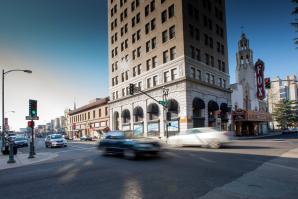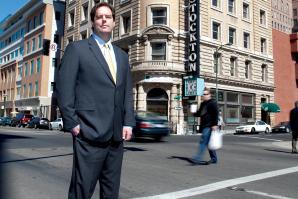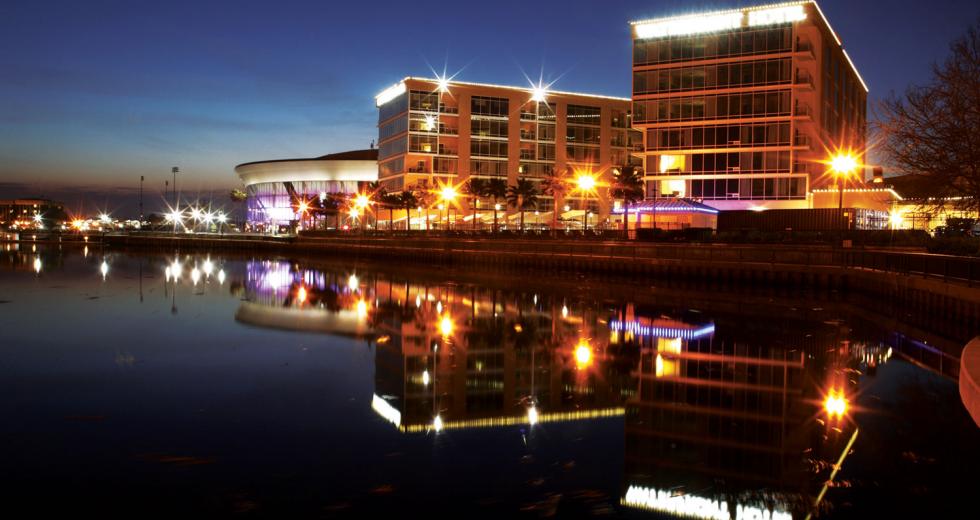Forget books, exams and professors. The campus buzz at Stockton’s University of the Pacific is about the hottest new idea in off-campus housing: Lofts at the University Plaza Waterfront Hotel.
It’s all about getting rental value where the river flows into downtown, the sports action is just next door and the lifestyle is hip and hospitable.
“I was blown away,” says Preet Kaur, a finance major from Chico who toured the boutique-style hotel. “When I saw it, my jaw dropped. It was exactly what I wanted, a dream come true.”
Kaur is one of more than 400 upper-division and graduate students expected to reside here and commute to the campus, two miles north. Beyond new rooms and a full range of hotel amenities, they’ll connect with a city most students hardly know.
While the smart, upbeat hotel is already a rendezvous for locals, the student presence is expected to change the face and pace of life here, bringing a much-needed cash infusion to the hard-hit local economy and enlivening a downtown whose revitalization is a city priority. Students expecting a room with a view also will find a window on a city of gritty challenges and attractive potential.
The potential claimed the interest of Sacramento developer Patrick K. Willis.
“I was amazed at what had been accomplished in the downtown — a great start on a mixed-use project, but one that needed completion to make the downtown a destination,” he says. “I think the students will give our hotel exposure and connection with Stockton, and the hotel will give students an opportunity to get involved with Stockton. It’s an incredible opportunity for us.”
A specialist in repossession and restoration properties, Willis acquired a foreclosed hotel whose unfinished features were a symbol of the city’s stalled development. Mayor Ann Johnston gave Willis connection with both the city and university, guiding him through the permit process and alerting university president Pamela Eibeck about his interest in a student-housing component. Eibeck liked the idea of a stylish and secure hotel operation for student living.
“It’s wonderful to have local businesses think creatively about how to cater to our students, which is what the University Plaza has done,” she says. “The hotel recognizes the business potential of offering housing to students in a great location for a reasonable rate.”
“What begins as a place for comfort and convenience will develop, in some, an enlarged role of citizenship, and the hotel in which they live will become for them more than a residential center.”
Robert Benedetti, professor, University of the Pacific
City officials approved the developer’s plan to devote five floors of the building to student housing, with 42 condo-style lofts and 100 dorm-style lofts. The move helps alleviate the campus-housing crunch and provides the hotel a stable population.
Willis renamed the hotel to identify its university connection
and began a $6 million restoration, transforming the former white
elephant into a chic and vibrant symbol of downtown revival.
At the head of the Stockton Channel, the hotel is adjacent to the city’s eponymous arena, noted for concerts and Stockton Thunder hockey games. Students also can enjoy the action at nearby Banner Island Ballpark, home field of the Stockton Ports. Across El Dorado Street to the east are a multiplex cinema, restaurants, lounges and the landmark Bob Hope/Fox Theater.
With free shuttles connecting students to the university and Pacific Avenue’s trendy Miracle Mile, the hotel’s multiple options appeal to students seeking both freedom and security.
“You can study in a private condo area that’s fully furnished, with a great view and hotel amenities, or you can be surrounded by people in the lobby or pool or you can go out and explore Stockton,” Kaur says. “It’s the best of both worlds.”
Students can order room service or dine at the Delta Bistro, where Chef Jeff Stogsdill’s diversified menu incorporates suggestions from a student focus group (students also had input on room design and decoration). In fair weather, meals can be enjoyed poolside. Palm trees, broad umbrellas, fire pits and cozy seating lend the area resort flair.
Willis sees no challenge in a “hybrid hotel” serving the general public and residents — a mix that has worked to the advantage of crowded colleges nationwide. The hotel will accommodate the most significant student-housing shift since the university opened in 1924.
Pacific professor and urban analyst Robert Benedetti says the hotel can facilitate student participation in the life of the city, increasing interest in local issues and volunteerism.
“What begins as a place for comfort and convenience will develop, in some, an enlarged role of citizenship, and the hotel in which they live will become for them more than a residential center,” Benedetti says. “Stockton is a very important resource for us, a research project and a teaching tool.”
It’s in the university’s interest, Benedetti says, to help
improve the city and make Stockton a better place for all. That
outreach is at the heart of the mission defined by Eibeck’s
Beyond Our Gates initiative.
“We have a beautiful campus with a good academic reputation for our programs, but we need to do something about Stockton’s problems, and that means getting involved,” Benedetti says.
Willis takes pride in his hands-on role as a stakeholder in the restoration of a district hit hard by economic downturn, stalled development and the closure of redevelopment agencies. Without state funding, Stockton must rely on private enterprise to attract residents and retailers. The hotel is a positive example of that, says Stockton Chamber of Commerce CEO Douglass Wilhoit, Jr.
“It’s a very exciting example of thinking outside the box and one that I think will be very successful,” Wilhoit says. “I think Pat will make it work, because he’s not only an investor but part of the day-to-day operation of a partnership between the university and private enterprise in which he believes. His example will make people believe in the possibilities of the downtown and should encourage other entrepreneurs and business people interested in investing.”
Students could become a highly visible presence here, enjoying the good life but also researching and writing about how a city under economic siege can activate the machinery of economic recovery.
“It’s exciting to see Stockton from a different perspective,” Kaur says. “Being closer to the downtown and waterfront will give me an exposure beyond movie theaters and sporting events. I think of Stockton as starting to transform itself, starting to make changes that will be not only helpful for the city but helpful to students as well.”
For more information on Ken James:
www.kjamesimages.com
Recommended For You

Slouching Toward Genesis
As reconstruction begins, Stockton searches for itself
Since filing for bankruptcy last year, Stockton hasn’t seen any immediate improvement. The city ended the year with 71 murders, a steady climb from only 26 in 2009. The rise has been attributed to a shrinking police force after the city slashed the department’s budget.

The Stockton Forecast
Acuity with Jeff Michael
Jeff Michael, 42, is the director of the Business Forecasting Center at the University of the Pacific.



